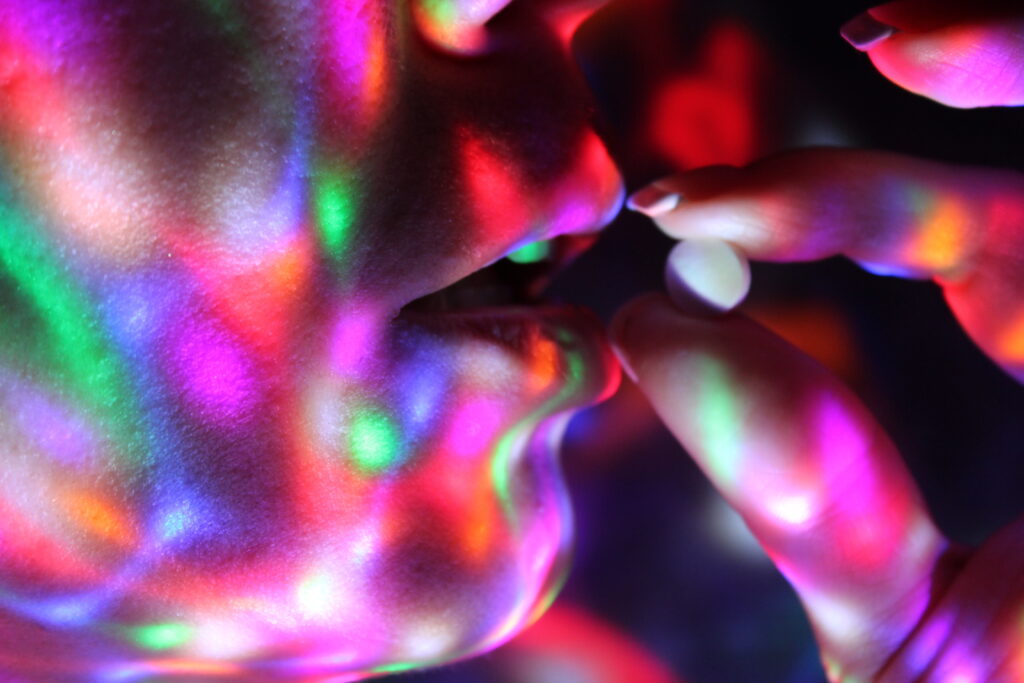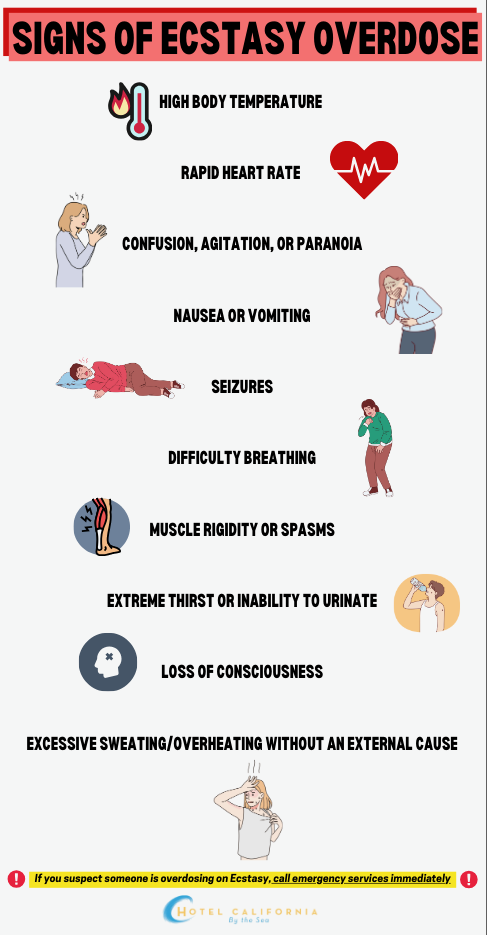OD on Ecstasy
In 2021, an estimated 2.6% of American young adults reported using ecstasy. Ecstasy, MDMA or molly, is a popular party drug often consumed in clubs, dance parties and raves along with other legal and illicit substances such as cocaine, marijuana and alcohol. Why is it considered a party drug? It is commonly found in those types of environments because the music and dancing often intensify the desired effects of the drug. Unlike other mind-altering substances, ecstasy can actually produce dangerous and life-threatening reactions at any dose. In some cases, overdoses have occurred even after the smallest amount of the drug was taken.

MDMA or 3, 4-methylenedioxymethamphetamine, is a synthetic illegal stimulant substance often abused for its hallucinogenic effects. Common adverse side effects of MDMA include anxiety, confusion, depression, paranoia, psychosis, sleep issues and difficulty concentrating. Ecstasy abuse causes damage to the neurons in the brain leading to long-term memory issues and even decreased intelligence. When an overdose occurs in the body, it is because the body is unable to process and eliminate ecstasy fast enough before it builds up to a toxic amount.
It is possible to overdose on ecstasy. But it is a rare occurrence. A lethal dose of MDMA is even more rare. According to a 2006 medical report from the British Journal of Anesthesia, ecstasy overdose death is generally due to a few main causes: heatstroke, serotonin syndrome, and water intoxication due to low blood sodium levels.

Signs of an OD on Ecstasy
- Increased amounts of energy
- Overt display of emotions including empathy and talkativeness
- Irrational body movements
- Blurred vision
- Confusion, anxiety and panic attack
- Excessive sweating and dehydration
- Lockjaw or jaw-clenching
- Rigid muscles
- Dry mouth
- Nausea and vomiting
- Increased heart rate and abnormal heart rhythms
- Sudden heart failure or stroke
- Acute liver failure
- Brain swelling
- Seizures
- Hallucinations and delirium
- Difficulty breathing
- Unconsciousness
- Serotonin toxicity – MDMA causes increased levels of serotonin, norepinephrine and dopamine in the body. These neurochemicals contribute to feelings of euphoria and increased energy levels when abused. However, there is such a thing as having too much serotonin. This can lead to sweating, confusion, rigid muscles and increased body temperature. As high as 15% of people who develop serotonin syndrome end up dying.
- Increased body temperature – Taking ecstasy can promote increased body temperature and heat exhaustion. This drug is commonly taken during dance parties or music festivals where people are dancing all night long in warm and crowded environments. Increased body temperature can harm internal organs as well as raise blood pressure and makes the heart rate spike. Some people’s body temperature can reach up to 110 degrees Fahrenheit. This can cause severe kidney damage and even kidney failure.
- Water intoxication – Because this drug causes body temperature to rise, people can end up drinking too much water in an attempt to cool down body temperature and avoid overheating. However, too much water can dilute the level of sodium in the blood and can lead to brain swelling, coma and death. Common symptoms of water intoxication include confusion, seizures and delirium.
Check Your Insurance Coverage for FREE
Find out if your insurance covers addiction treatment in minutes. We accept most insurance!
Risk factors that impact Ecstasy overdose
- Purity of the drug. In certain forms of the MDMA such as molly, the substance is not pure and can contain other unknown compounds in unknown amounts. This creates a high risk of overdose because the drug tablets or powder can be cut with other dangerous substances that enhance the adverse side effects of molly.
- Dosage of the drug. Illicitly manufactured drugs don’t always list the dosage of each ingredient. The practice of stacking and piggybacking molly in which a person will take multiple doses of the drug can lead to high levels. These extreme doses of MDMA can be too much for the body to metabolize and eventually lead to toxicity and overdose.
- Drug tolerance. Those who have a low tolerance for substances have a higher risk for overdose.
- Immune system and overall health. People who have underlying health factors can be at higher risk for experiencing fatal overdose symptoms.
- Environment. MDMA and ecstasy are often taken in clubs, music festivals and loud parties. Ironically, these types of environments and settings can actually worsen the symptoms and adverse side effects of ecstasy and lead to overdose.
- The Illicit nature of the drug. Ecstasy tablet production is largely unregulated so many people who take it are unaware of the quantity of the substance or substances they may be ingesting. There is a wide variability in dosage for each tablet. Not knowing can pose a high risk of consuming too much and lead to overdose. Not only that, it can include other substances that intensify the toxicity of the drug and lead to overdose.
- Mixing. Oftentimes young people who are taking ecstasy are also taking it with other substances such as alcohol and marijuana. Polysubstance use puts a person at a higher risk for overdose. Most complications associated with ecstasy occur when people take it alongside other drugs.
How much do you need to consume to Overdose on Ecstasy?
Overdosing on any substance can be dangerous and even fatal. When it comes to ecstasy, each user metabolizes and responds to the drug differently. This is the main reason why an overdose of ecstasy can occur at any dosage. A standard ecstasy table contains a dose of around 80-125mg. However, people often take multiple doses when using at the club, at a rave or at a music festival. These types of events last for a long period of time and taking multiple doses in an attempt to make the effects last longer can results in dangerously high body temperatures. This often leads to heatstroke.
Because ecstasy pills are illicitly manufactured, it is almost impossible to know the potency of the drug. When all these factors are added up, it can lead to a dangerous outcome in which a person can overdose from too much of the drug causing a fatal overdose.
Reach out to Hotel California by the Sea
We specialize in treating addiction and other co-occurring disorders, such as PTSD. Our Admissions specialists are available to walk you through the best options for treating your addiction.
Treatment for Ecstasy Overdose
Unlike other drugs such as opioids, there is no antidote or medication that can reverse MDMA overdose. Treatment for an overdose of ecstasy requires professional medical attention and generally includes support in treating side effects and symptoms. Some of the most common types of treatments include rapid cooling of body temperature to prevent overheating, the use of activated charcoal to absorb remnants of the drug to prevent it from entering the bloodstream, providing fluids and administering medication to balance out the high blood pressure.
What can you do if you suspect someone has OD on ecstasy? Call emergency services, explain the situation, take the person to a quiet area, give them sips of water and inform the first responders of what drugs or substances were taken.
Treatment for Substance Use Disorder
Overdose on ecstasy is rare. However, it is still possible to overdose. Alarmingly, overdose can happen at any stage and at any amount of ecstasy use. MDMA tablets are unregulated so users are largely unaware of the dosage they may be taking. MDMA can have serious short-term and long-term side effects. Professional behavioral health treatment programs such as Hotel California by the Sea provide substance use treatment as well as polydrug use treatment.
We offer treatment at all levels of care including detox, residential, PHP and IOP. We also utilize evidence-based treatment methods such as CBT, DBT and EMDR therapy. Hotel California by the Sea is dedicated to helping clients reach their goals of recovery and overcoming their addiction.
References:
https://www.ridgefieldrecovery.com/drugs/ecstasy-mdma/overdose
https://www.rehabcenter.net/mdma/overdose/
https://addictionrehabtoronto.ca/can-you-overdose-on-molly/
https://www.drugrehab.com/addiction/drugs/ecstasy/overdose
https://zinniahealth.com/substance-use/mdma/overdose
